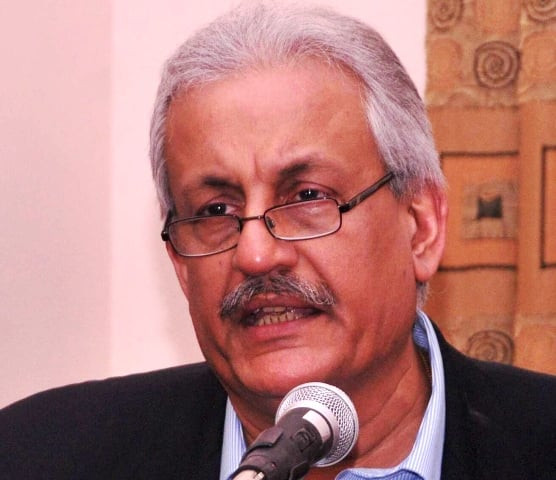Federalism and 18th Amendment: ‘Provinces denied powers during military rule’
2-day conference kicks off at the Lahore University of Management Sciences.

The Balochistan issue and the creation of new provinces kept cropping up on the first day of a two-day conference on ‘Federalism in Pakistan after the 18th Amendment’.
The conference at the Lahore University of Management Sciences (Lums) has been organised by the Hans Siedel Foundation in collaboration with the Lums Humanities and Social Sciences Department.
Senator Raza Rabbani, who was one of the speakers, said it was “essential” to stop “foreign interference” in the region. He said that issues in Balochistan needed to be resolved, in particular that of the ‘missing persons’.
Rabbani, who was introduced as the ‘father of the 18th Amendment’, said he agreed that the 18th and the 19th amendments were not perfect.
Condemning the drone attacks, the senator denied that the government had allowed such attacks. He termed them “Musharraf’s doing”, adding that the PPP government had responded strongly to such violations of the country’s sovereignty.
Former federal minister Sartaj Aziz called the passage of the 18th Amendment “a historic step forward” despite of some implementation issues. Aziz advised the government to address the situation in Balochistan “before it gets critical”.
Former Punjab governor Shahid Hamid, during the session ‘Restructuring the federation’, said that dictatorship denies provincial autonomy. He said that during military regimes the provinces had been denied powers, “which were theirs to begin with”. Dictators, he said, gave governors more powers thus establishing a “command structure”.
Professor Mohammad Waseem, a political science teacher at Lums, said the 18th Amendment was vague about what it could offer minorities. He termed the issue of creation of new province “the grand debate”. He noted that some political parties advocated the creation of new provinces in provinces where they did not have considerable support but shied away from the issue in their own provinces.
Dr Ayesha Jalal chaired a session on ‘Emerging provincial dynamics’. Talking about provincial autonomy, Dr Syed Jaffar Ahmed, director of the Pakistan Studies Centre at the University of Karachi, stressed the need for social reforms. He called for FATA’s integration into Khyber-Pakhtunkhwa and ‘functional representation’ of marginalised sections of the society in the parliament and provincial assemblies.
“The Punjab government has always spent less in southern Punjab,” noted Dr Ayesha Siddiqa during her session ‘Re-imagining Pakistan’. In her view creation of more provinces would “dilute power of the part of Punjab, seen by many as the manipulator.”
Calling Sindh ethnically and linguistically heterogeneous, Dr Haider Nizamani commented that for the Sindhi nationalist, the 18th Amendment was not a solution. “Sindhi nationalists have had very little representation,” he said.
Dr Adil Najam, the Lums vice chancellor, said that such events helped develop a better understanding about pertinent issues. Dr Grace Clark (Social Sciences dean at the FC College University), Dr Pervez Hoodbhoy and Dr Tariq Rehman (Dean of the School of Education at BNU) also attended the conference.
Provincial identities, impact of devolution on education and health and international perspectives on federalism will be discussed today (Thursday).
Published in The Express Tribune, March 15th, 2012.


















COMMENTS
Comments are moderated and generally will be posted if they are on-topic and not abusive.
For more information, please see our Comments FAQ